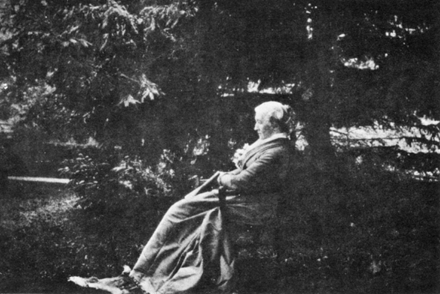
Elizabeth Cady Stanton: an exhausted mother who changed the world
Share
This post was originally sent to my newsletter subscribers on May 29, 2025. Click here to subscribe.
My bedtime reading this week has been 'Eighty Years and More', the memoir of the great women's rights campaigner, Elizabeth Cady Stanton.
My bedtime reading this week has been 'Eighty Years and More', the memoir of the great women's rights campaigner, Elizabeth Cady Stanton.
Here she is around the time she wrote the book, in 1897:

It's a fascinating read.
There's a lot I could write about her memoir - it's chock full of fascinating and inspiring historical tidbits - but today I want to tell you about Elizabeth's early life, and how her feminism came into being.
Elizabeth (or 'Lizzy' as her friends knew her), was born in 1815 in upstate New York, and she spent most of her life in that region, putting her squarely in the world of Rose and Charley, the main characters in my upcoming book.
(I picked up her memoir for this reason - to get a feel for what the world of abolitionists and early feminists was like in New York State in the 1830s and 40s.)
As a child, Lizzy led a privileged life. Her family was wealthy, and she received a much better education that most girls of her time.
Her father, Daniel Cady, was a lawyer who both practiced and taught law. Lizzy remembers sitting in his office, listening to the complaints of women who came to him seeking legal help. As the laws of the time were firmly stacked against women, she recounts her childish frustration that often, there was so little her father could do to help them.
Daniel's law students often visited their house, and as she grew older, a teenaged Lizzy made a habit of debating the young men about women's issues.
This was the beginning of her feminism.
In 1840, against her father's wishes, Lizzy married the dashing abolitionist campaigner, Henry Stanton. They spent their honeymoon in London, where Henry was a delegate to the first World Anti-Slavery Convention.
This convention was split into two factions: those who believed women should be included in the abolitionist movement, and those who did not. Ultimately, after much heated debate, the women delegates were relegated to a gallery, and not permitted to participate.
It was a crushing defeat, especially for the female delegates who had traveled across the Atlantic to attend (and were accustomed to being included as full-fledged members of the abolitionist movement in America.)
But - as often seems to be the case - short-term defeat led to long-term victory.
For it was in the women's gallery at the World Anti-Slavery Convention that Lizzy (then a newlywed on her honeymoon, only tangentially connected to the abolitionist movement) met Lucretia Mott and the other female American delegates - all of whom were seasoned campaigners passionate about the rights of both enslaved people and women.
They became fast friends.
And these friendships were the seeds that ultimately grew into the women's rights movement in America.
Eight years later, after living in Boston for a time, Lizzy and Henry settled in Seneca Falls, New York. (About half way between Syracuse and Rochester.) By now, Lizzy was a mother to three boisterous boys, and her station as mother and wife was beginning to wear on her.
Here's an excerpt from her memoir of that time:
In Seneca Falls my life was comparatively solitary .... Mr. Stanton was frequently from home, I had poor servants, and an increasing number of children. To keep a house and grounds in good order, purchase every article for daily use, keep the wardrobes of half a dozen human beings in proper trim, take the children to dentists, shoemakers, and different schools, or find teachers at home, altogether made sufficient work to keep one brain busy, as well as all the hands I could impress into the service. Then, too, the novelty of housekeeping had passed away, and much that was once attractive in domestic life was now irksome. I had so many cares that the company I needed for intellectual stimulus was a trial rather than a pleasure.
Here's a picture of Lizzy from that time:

That look on her face... the mix of stoic determination and exhaustion. It's so familiar to me. I think most mothers can relate.
Here's a bit more from her memoir in that pivotal year of 1848:
The general discontent I felt with woman's portion as wife, mother, housekeeper, physician, and spiritual guide, the chaotic conditions into which everything fell without her constant supervision, and the wearied, anxious look of the majority of women impressed me with a strong feeling that some active measures should be taken to remedy the wrongs of society in general, and of women in particular. My experience at the World's Anti-slavery Convention, all I had read of the legal status of women, and the oppression I saw everywhere, together swept across my soul, intensified now by many personal experiences. It seemed as if all the elements had conspired to impel me to some onward step. I could not see what to do or where to begin–my only thought was a public meeting for protest and discussion.
In this tempest-tossed condition of mind I received an invitation to spend the day with Lucretia Mott, at Richard Hunt's, in Waterloo. There I met several members of different families of Friends, earnest, thoughtful women. I poured out, that day, the torrent of my long-accumulating discontent, with such vehemence and indignation that I stirred myself, as well as the rest of the party, to do and dare anything. My discontent, according to Emerson, must have been healthy, for it moved us all to prompt action, and we decided, then and there, to call a "Woman's Rights Convention." We wrote the call that evening and published it in the Seneca County Courier the next day, the 14th of July, 1848, giving only five days' notice, as the convention was to be held on the 19th and 20th.
That convention, inspired by the righteous discontent of a frazzled, well-connected housewife at her wits end, and scheduled with only five days notice, was the very first public meeting dedicated to the discussion of women's rights in the United States of America.
Despite the astoundingly short lead time, three hundred people attended The Seneca Falls Convention, including Frederick Douglas and many other leading abolitionists of the time.
It was the beginning of the incredibly long and incredibly hard fight for women's suffrage and legal rights in America - a fight that in many ways we're still fighting today, and a fight that Lizzy never saw the end of. She died in 1905, fifteen years before women in America gained the right to vote.
So what's the moral?
Never doubt the determination of one angry woman?
Never give up, even in the face of crushing defeat
There's great power in female friendships?
Maybe all of those thing?
I don't know - what do you think?
Click here to subscribe and join my community of readers.
My newsletter is an eclectic mix of stories I've uncovered in my historical research, thoughts and updates on writing and life, and other bits of beauty delivered to your inbox each Thursday. I hope to see you there!
